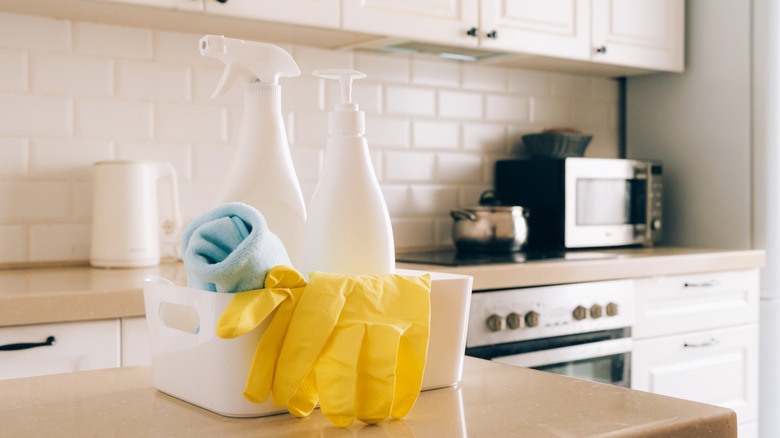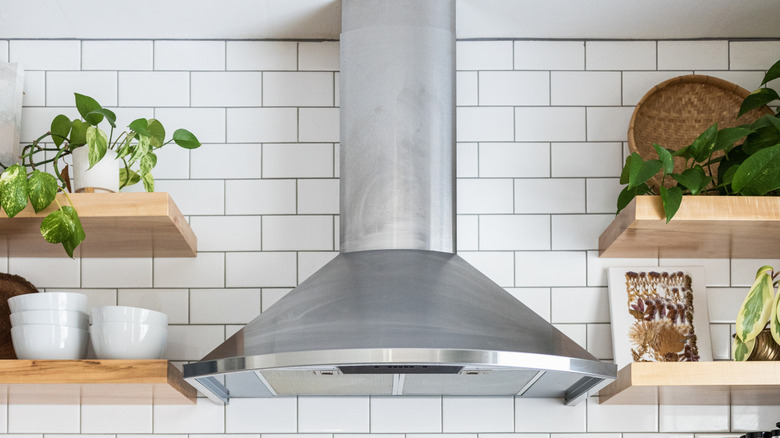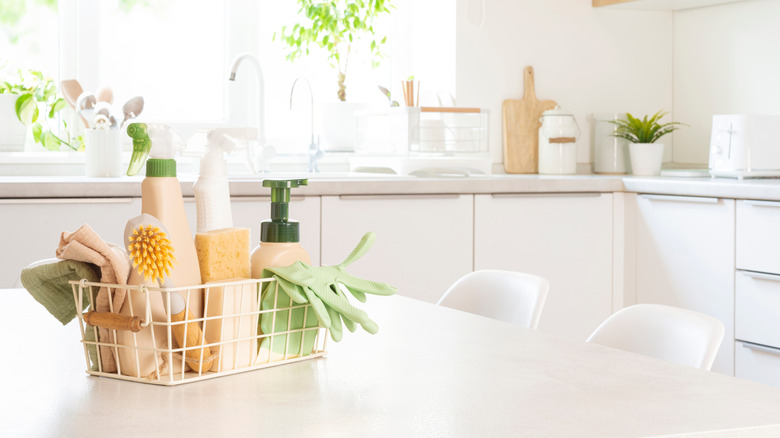If You're Not Cleaning This Part Of Your Kitchen, You're Putting Your Whole House At Risk
Most of us wipe down counters, degrease the kitchen cabinets (sometimes at least), scrub sinks, and mop up spills regularly. But there's one dirty part of the kitchen that many never think to clean, and that's the range hood. That metal canopy above your stove isn't just decorative; it's designed to pull cooking fumes, smoke, and airborne grease away from your food and out of your home. But if you're not cleaning it regularly, especially the filter and inner components, you're not just neglecting hygiene, you're risking a grease fire in your kitchen. You may feel like this is an obvious piece of advice, but you would be surprised at how many folks don't actually clean it, and definitely not regularly — wiping just the outside doesn't count.
Grease buildup in range hoods is a serious fire risk. As hot vapors rise during cooking, especially when frying or sautéing, they carry tiny grease particles into the vent system. Over time, these particles coat the inside of the range hood and filter. If this buildup isn't cleaned out, it becomes highly flammable. A small flame or flare-up on the stovetop could easily ignite the grease and send fire into the vent system, quickly spreading to cabinets and beyond.
What makes it especially risky is how invisible the danger is. Your stovetop may look clean, but a dirty range hood can quietly accumulate months — or years — of grease behind the scenes. And unlike regular surface cleaning, this isn't something you can just ignore until spring cleaning season rolls around; routine maintenance is essential!
How to properly clean your range hood before it becomes a hazard
Cleaning a range hood might not be glamorous, but it's easier than most people think. So, even if it's a pain to remember, your household safety is worth it. Start by checking what type of filter your hood uses. Most range hoods use either a metal mesh filter or a charcoal filter. Metal filters are reusable and should be cleaned monthly, especially if you cook frequently with oil. Simply remove them and soak them in hot, soapy water or run them through the dishwasher if the manufacturer says it's safe. If you're dealing with a charcoal filter, you'll probably need to replace it every few months instead.
But the filter isn't the only part that needs attention, as the inner walls of the range hood also collect grease and grime. Use a degreasing cleaner or a basic mix of vinegar and baking soda to wipe down all accessible surfaces. Be sure the unit is off and unplugged before you clean to avoid any electrical issues, and don't forget the fan and the duct if you have access. Grease can build up there, too, posing an even bigger fire hazard.
Even if you're diligent about wiping down your stovetop, skipping the range hood puts your entire kitchen at risk. Cleaning this area regularly not only helps improve ventilation and keeps your cooking space smelling fresher, but it could also prevent a dangerous kitchen fire that could cost you big in the end. And usually, once you add it to your cleaning routine, it quickly becomes second nature.
Why regular range hood cleaning protects more than just your kitchen
When people think about fire safety, they usually focus on obvious dangers like open flames, faulty wiring, or unattended candles. But the kitchen is one of the leading sources of house fires, and many of those fires don't start from an accident with the stove. They start from the invisible grease trapped in neglected range hoods. What starts as a flare-up in a pan can quickly turn catastrophic.
Beyond fire safety, there's another reason to keep your range hood clean, and that's air quality. A dirty hood doesn't do a great job of filtering smoke, steam, and cooking odors. That means grease particles and moisture stay trapped inside your home, clinging to walls and ceilings and making your entire kitchen feel grimy. For households with asthma, allergies, or other respiratory sensitivities, that poor air circulation can make symptoms worse.
The U.S. Fire Administration estimates that cooking fires cause hundreds of millions of dollars in property damage every year. Many of these could be prevented with simple maintenance. Don't wait until your hood is dripping or smelling funky to act. A little monthly upkeep could be the one thing standing between your family and a kitchen emergency.


